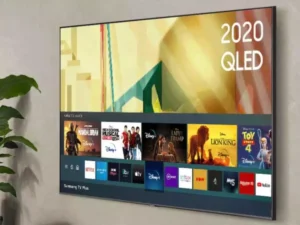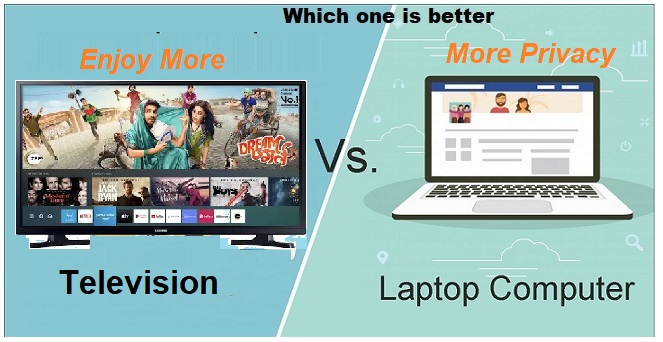Advantages of television over computers
- There are several types of TV which make it interesting for you and enjoyable in the home
- In the previous post, you studied the advantages and shortcomings of television.
- There are several advantages of television over computers.
Bigger Screen
- Televisions generally have larger screens than computer monitors, making it easier to watch and enjoy content with others.
- Most TV has much larger screens ( more than 24 inches). You can not use a laptop with more than 16-inch of screen
Comfortable Watching
- Televisions are often set up in a comfortable living room or family room environment, allowing viewers to sit back and relax while they watch their favorite shows.
Ease of Use
- Televisions are typically easier to operate than computers, as they require fewer steps to turn on and access content.
Wide availability
- Televisions are available in almost every household, while computers are not always as prevalent.
No distractions:
- Televisions are typically used solely for entertainment purposes, whereas computers can also be used for work, communication, and other tasks, which may lead to distractions while watching TV.
Cost of Watching Moview
- The cost of normal LCD TV is much lower than a laptop
- You have to pay for the channel on TV
No Skill and Expert Required
- You do not need an expert or skilled person for TV
- Anyone can operate a TV easily. Computers pr Laptop need experts to operate it
Safe and low Damage from Kids
- Kids can damage laptops and computers. However, the TV is placed at a higher distance and kids can not touch to damage it
That being said, it’s important to note that computers have many advantages over televisions as well, such as the ability to access a wider range of content, interact with others online, and perform a variety of tasks beyond just entertainment.

Advantages of Laptop over Television in Home
Laptops and televisions serve different purposes and have their own unique advantages, but here are some potential advantages of a laptop over a television:
Portability:
- Laptops are portable and can be easily carried around, making them ideal for people who need to work or study on the go.
Versatility
- Laptops can be used for a variety of purposes, including work, entertainment, and communication.
- They can be used to browse the internet, watch videos, play games, and more.
Personalization
- Laptops can be personalized to meet the user’s specific needs and preferences
- with the ability to install software, customize settings, and connect to a variety of devices.
Productivity and Learning of professional courses
- Laptops are designed for productivity and allow users to work on projects, create presentations, and complete assignments efficiently.
- The laptop is useful for creating and learning of coding, creative and professional courses
Access to the internet:
- Laptops provide access to the internet, allowing users to stay connected with friends and family, access social media, and stay up to date with news and current events.

Disadvantages of Laptop
While laptops offer many advantages, there are also some potential disadvantages to consider. Here are a few:
Limited screen size:
- Laptops typically have smaller screens than desktop computers or televisions, which can make it more difficult to multitask or view detailed information
- Laptops typically have smaller screens than desktop computers or televisions, which can make it hard to work on certain tasks or watch videos for extended periods.
Limited upgrade options
- Many laptops are not designed to be easily upgraded or repaired, which can be a disadvantage for users who need to replace or upgrade components like the processor, graphics card, or memory.
Ergonomics:
- Laptop keyboards and touchpads are often smaller and less ergonomic than desktop peripherals, which can lead to discomfort or even injury if used for extended periods of time.
Limited Battery life
- Unlike desktop computers, laptops rely on batteries for power, which can limit their use time without being connected to a power source.
- While many laptops have long battery lives, they still need to be charged regularly, which can be inconvenient if you need to use your laptop for extended periods of time without access to a power outlet.
Limited Upgrade
- Unlike desktop computers, laptops are not as easily upgradable in terms of hardware components like RAM, graphics cards, or storage.
Heating Issue
- Overheating due to high graphics videos
- Laptops can generate a significant amount of heat, especially when used for prolonged periods, which can be uncomfortable or even damaging to the device if it’s not adequately cooled.
High Cost
- Laptops can be more expensive than desktop computers with similar specifications, especially if you’re looking for a higher-end model
- Laptops can be expensive, especially if you want high-end features like a powerful processor, high-resolution display, or dedicated graphics card.
Summary
- Overall, laptops offer a range of advantages over televisions, particularly in terms of portability, versatility, personalization, productivity, and internet access
- However, it’s worth noting that televisions are still the preferred option for many people when it comes to watching movies and TV shows on a larger screen
- It’s important to consider these potential disadvantages when deciding whether a laptop is the right choice for your needs and to weigh them against the advantages that a laptop can offer.
- while purchasing keep in mind that these disadvantages are not universal and can vary depending on the specific laptop model and user needs. Additionally, for many people, the advantages of laptops can outweigh the disadvantages, making them a worthwhile investment.

